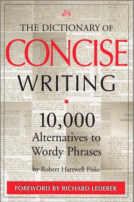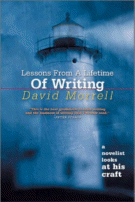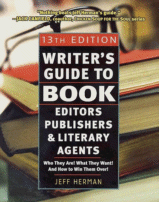Reviews of Writing Books
The Dictionary of Concise Writing by Robert Hartwell Fiske
Marion Street Press, August, 2002Paperback, 412 pages
ISBN: 0966517660
Ordering information:
Amazon.com
 Concise writing has always been crucial for
journalists and communications professionals.
However, the need for concise writing has
expanded substantially with the demand for
short articles and pieces in web magazines,
online newspapers and websites. This book begins
with a chapter explaining why concise writing is so important,
and offers practical suggestions about how to make
your writing more concise. The chapter also points
out numerous ways wordiness creeps into our writing.
The bulk of the book is the dictionary itself, which is
a very useful collection of wordy phrases that
can be shortened or deleted. Each entry includes a list
of short alternative words and a sentence showing how
the shorter alternative word or phrase works. For example,
excruciatingly painful becomes excruciating or painful,
in spite of the fact that becomes although or even though
and window of opportunity becomes chance or opportunity.
This dictionary's author, Robert Hartwell Fiske, is also the
publisher of The Vocabula Review, an online journal about the
English language. The Dictionary of Concise Writing
is a must-have resource for journalists and writers. It
contains thousands of ways to trim your sentences
and strengthen your prose.
Concise writing has always been crucial for
journalists and communications professionals.
However, the need for concise writing has
expanded substantially with the demand for
short articles and pieces in web magazines,
online newspapers and websites. This book begins
with a chapter explaining why concise writing is so important,
and offers practical suggestions about how to make
your writing more concise. The chapter also points
out numerous ways wordiness creeps into our writing.
The bulk of the book is the dictionary itself, which is
a very useful collection of wordy phrases that
can be shortened or deleted. Each entry includes a list
of short alternative words and a sentence showing how
the shorter alternative word or phrase works. For example,
excruciatingly painful becomes excruciating or painful,
in spite of the fact that becomes although or even though
and window of opportunity becomes chance or opportunity.
This dictionary's author, Robert Hartwell Fiske, is also the
publisher of The Vocabula Review, an online journal about the
English language. The Dictionary of Concise Writing
is a must-have resource for journalists and writers. It
contains thousands of ways to trim your sentences
and strengthen your prose.
Lessons From a Lifetime of Writing: A Novelist Looks at His Craft by David Morrell
Writer's Digest Books, March, 2002Hardcover, 243 pages
ISBN: 1582971439
Ordering information:
Amazon.com
 New York Times bestselling author David Morrell
certainly knows how to craft a novel which
readers will rush to the stores to buy. After all,
he gave the world Rambo in his classic novel
First Blood, as well as numerous bestsellers such as
The Brotherhood of the Rose, The Fifth Profession,
Desperate Measures and Burnt Sienna.
But fans might be surprised to learn that Morrell
was a professor of American literature for many years, and
is equally at home discussing the classics as he is
dissecting the perfect suspense novel. Luckily for
aspiring authors, Dr. Morrell has written a
new book sharing his insights as an author for over
thirty years.
New York Times bestselling author David Morrell
certainly knows how to craft a novel which
readers will rush to the stores to buy. After all,
he gave the world Rambo in his classic novel
First Blood, as well as numerous bestsellers such as
The Brotherhood of the Rose, The Fifth Profession,
Desperate Measures and Burnt Sienna.
But fans might be surprised to learn that Morrell
was a professor of American literature for many years, and
is equally at home discussing the classics as he is
dissecting the perfect suspense novel. Luckily for
aspiring authors, Dr. Morrell has written a
new book sharing his insights as an author for over
thirty years.
The book is written in a friendly, approachable style -- it is clear why he was such a popular teacher for so many years. In fact, reading the book is like having a one-on-one tutorial with David Morrell. He covers every topic imaginable, from finding out why you really want to write a novel, how to get focused, creating plots, characters, structure, and believable dialogue. He also covers point of view, research, descriptions, writer's block, and how to get published and market your books. The advice is excellent, and Dr. Morrell provides wonderful (and often quite funny) anecdotes from his own experiences as a writer. This is a must-have for anyone with serious aspirations to be a novelist.
Writer's Guide to Book Editors, Publishers and Literary Agents 2003-2004 by Jeff Herman
Prima, July, 2002Trade Paperback, 892 pages
ISBN: 076153735X
Ordering information:
Amazon.com
 The new edition of the annual Writer's Guide
offers a plethora of detailed information for
would-be authors about agents, editors and publishers.
The publisher listings are divided into four sections: U.S.
publishers, university presses, religious, spiritual, and
inspirational publishers and Canadian publishers. The
publisher listings include contact information and names
of editors, full write-ups about the publisher, including
recently published books, a description of any imprints and
background information about the editors. Some questions and
answers are with a specific editor are also provided.
The second section
in the book covers agents. Like the publisher listings, agent
listings also include contact information and a write-up which
gives detailed information about each agent or agency. Some of
the agents also answer question and answers, and give their
descriptions of what makes a "Client from Hell" and what makes
a "Dream Client". A final section in the book contains essays
from industry insiders covering issues such as getting an agent,
book promotion, contracts, book doctors and self-publishers.
The new edition of the annual Writer's Guide
offers a plethora of detailed information for
would-be authors about agents, editors and publishers.
The publisher listings are divided into four sections: U.S.
publishers, university presses, religious, spiritual, and
inspirational publishers and Canadian publishers. The
publisher listings include contact information and names
of editors, full write-ups about the publisher, including
recently published books, a description of any imprints and
background information about the editors. Some questions and
answers are with a specific editor are also provided.
The second section
in the book covers agents. Like the publisher listings, agent
listings also include contact information and a write-up which
gives detailed information about each agent or agency. Some of
the agents also answer question and answers, and give their
descriptions of what makes a "Client from Hell" and what makes
a "Dream Client". A final section in the book contains essays
from industry insiders covering issues such as getting an agent,
book promotion, contracts, book doctors and self-publishers.
The Writer's Guide is written by New York literary agent Jeff Herman, owner of the Jeff Herman Literary Agency. The agent and publisher listings are invaluable; they contain inside information that you won't find elsewhere. When looking for an agent or publisher, it is crucial that writers target the right person who publishes that writer's type of book. The Writer's Guide takes the guesswork out of pitching, and is an essential tool for aspiring authors.
Return to Book Reviews Index
Return to the October 2002 issue of The IWJ.
More from Writers Write
